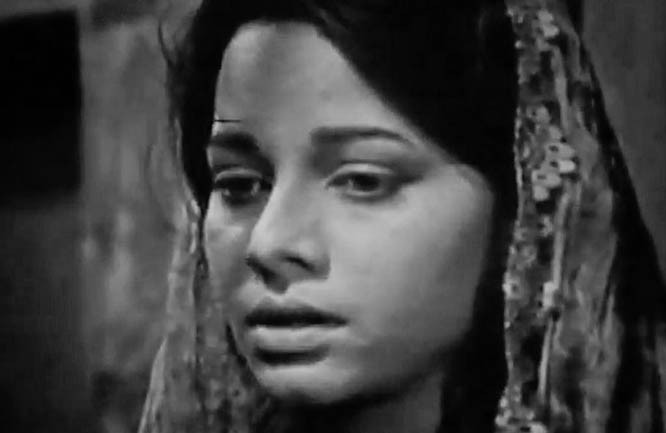
In Roohi Bano’s oeuvre, there was something about the depiction of a character that was lost to articulation, that was lived out more in a fantasy world, and she played it with an intuitive intensity

Roohi Bano had the talent to act like no one else. She acted by instinct and proved the claim that acting being an inborn talent can only be acquired in terms of quantity and not quality.
It was not mere chance that she excelled on television and not cinema or theatre. She did not really have the assets for stage: a strong expressive voice which could be heard right across the hall to reach even the audience sitting in the back rows; nor did she have the ability to make her body act as actors are required to do with movement across the stage.
Her sheer acting talent was thus contingent upon the camera which left her with two mediums for expression -- film and television. Film, unfortunately, was too typecast and hemmed in by larger-than-life rendering of characters. The themes that it tackled were rather limited, built around situations where marriage was the fulcrum on which revolved other issues of life, including the man-women relationship. The song and dance format, the major selling points of cinema, is usually built on glamour. Even tragedy and misery are glamorised and splashed to be the determining value in assessing a performance or the film itself.
But Roohi Bano’s genius could never have come out in such roles and situations. She was much closer to the school of acting that firmly based itself on realism. It is important to understand the role of television particularly in the Pakistani context. Of course things have changed now, with the emerging digital media, and other production houses and distribution networks coming into force in a big way. But, till about thirty years ago, it was said that theatre produced the actors, film produced stars and television was only a site for news coverage and talk shows.
Yet BBC had already shown that, within the limited screen width, much of significance can be shown. Thus, in Pakistan, where there were limitations of finances, and also of censorship, television as a medium broke new ground. Television had an advantage. Being state-sponsored, it did not have to sell itself at the box office but, within the limits of censorship, could express itself with much greater truth in the understanding of this society than other glossed-over mediums.
It did not require a lot of finances as the bill was picked up by the state itself. The writers who had been initiated by the radio working under the same format could bring on to the screen much that was closer to a correct depiction of the situations and character types that saddled this society.
Television had to work under a certain regimen; all that was meant to be stated could not be said but only through asides, innuendos and the unsaid. It appeared that this regimen was made for Roohi Bano to come into her own. She expressed herself so well in the unsaid, the innuendo and the aside.
She thus represented women, especially in our part of the world. The roles that were written for her, or rather the roles that were culled from our literature, were generally about women who had gone through millenniums of repression of all kinds. It was not only the repression that one understands in the conventional sense of not enough opportunity to play a role outside the house or home but a more seminal one -- like not being able to verbalise what they feel, the idiosyncratic dimensions of their biological makeup, the bond with the family, the children or not being able to produce one.
Literature may defy that and the characters may be bigger than the analysis that are clamped to understand them. It appeared that Roohi Bano epitomised the female character in our milieu. It was the repressed women, young vulnerable women who left much to the unsaid, even failing to face the full impact of their own desires, the fear of confronting the violence of their own passion. In Bano’s oeuvre, there was something about the depiction of a character that was lost to articulation, that was lived out more in a fantasy world, a world created in the mind as a defence against the variables of definitive relationships. She delved deep into the soul to be that person, a character that could feel very intensely but was trapped by circumstances to play certain laid down roles. It was a constant struggle to break through the confines and yet not being able to do.
Her creation of a role was thus very complex and not akin to carrying out a mission as roles or their interpretation has become of late. And she played those roles with an intuitive intensity. While acting, she seemed to be possessed, and would move or gesture or deliver a pause that came from nowhere but established the authenticity of the scene.
She seemed to involuntarily bring out her insides to match with the contours of the role; as a consequence her whole being was involved in the performance. She belonged to the school of acting where the character was lived through the person of the actor; to an extent that she was vulnerable to becoming the victim of playing characters to conflict with the rudiments of her person. The shift from one character to the other that many actors are prone to do makes them lose their own centre. Roohi Bano did not lose her centre.